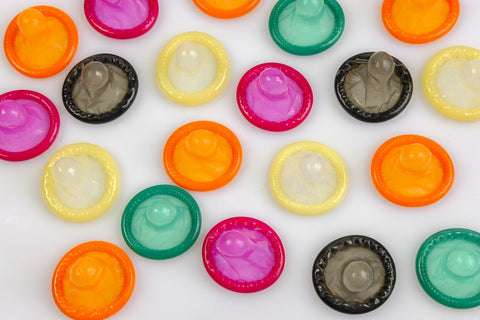Whether you use your mouth, tongue, and lips to stimulate a partner’s genitals; oral sex is a great way to experience sexual pleasure.
And it’s pretty popular too. In one of the biggest studies into sexual behavior in Britain, 71% of 16-24-year-old men and 80% of 25-34-year old men said they’d given or received oral sex in the last year. Among women it was almost the same; 70% of 16-24-year-olds and 80% of 25-34-year-olds.
With so many people enjoying cunnilingus, fellatio, going down, blow jobs, giving head and rimming, is there anything you need to know about enjoying oral sex safely?
Although there isn’t a risk of pregnancy, oral sex does carry a risk of sexually transmitted infections (STIs). This may be news to lots of people; in a survey we conducted for Sexual Health Week, more than half didn’t know that infections can be passed on during oral sex.
The infections most commonly passed on through oral sex are herpes simplex, which causes genital herpes, gonorrhea and syphilis, but other STIs can also be transmitted.
As with STIs passed on through vaginal or anal sex, you might not notice any signs or symptoms, so it’s important to know ways in which infections can be passed on and how to help prevent this happening.
STIs can be transmitted through skin to skin and hair to hair contact, and in body fluids. If there are symptoms, these could include a sore throat and blisters or sores in the mouth or on the lips.
There is usually more of an STI risk for the person who is giving oral sex (your mouth on their genitals) because they are more likely to come into contact with their partner’s body fluids. However, there is still a risk if you are receiving oral sex (their mouth on your genitals), because if they have an STI it could be passed on if they have any sores or blisters in their mouth, for example if they have genital herpes.
MAKING ORAL SEX SAFER
It is best to avoid oral sex if you or a partner know you or they have an STI.
It’s also a good idea not to do it if at least one of you has
sores, cuts, ulcers, blisters, warts or rashes around the genitals, anus or mouth
any unhealed or inflamed piercings in the mouth or genitals
a throat infection.
Because infections can also be passed on through menstrual blood it is best to avoid receiving oral sex while you are on your period.
CONDOMS AND DAMS
The only way to know for definite if you have an STI is to get tested. So unless you’re sure you and your partner(s) have tested negatively for infections, it’s always a good idea to protect yourself.
For oral sex involving a penis, a male condom can be used in the same way as it would be during vaginal or anal sex, so the mouth only comes into contact with the condom. A female condom can also be used to cover the penis.
For oral sex with a vagina or anus, a dam can be used to form a barrier between the mouth and genitals. A dam, also known as a dental dam, is a small square of plastic. You can buy readymade dams or you can even make your own by carefully cutting open a condom into a flat sheet.
It’s important to only use one side of the dam – keep it the same way up throughout – and to not move it between the vagina and anus as bacteria which is living harmlessly in the anus can be harmful in the vagina. You should use a new dam each time, and not recycle used ones.
Remember a condom or dam can only help prevent STIs being passed on in the area it is covering. They won’t protect areas where skin or pubic hair is exposed.
Other ways to help prevent STIs being passed on
Avoid brushing or flossing your teeth before or after giving someone oral sex as this can sometimes cause your gums to bleed. Brushing after oral sex won’t help prevent infection.
Avoid getting semen or vaginal fluid in your eyes.
TESTING AND TREATMENT
If you are worried you may have taken a risk during oral sex, or any other kind of sex, it’s best to get checked out. Remember not having any symptoms does not mean there is no infection.
FPA’s Find a clinic tool can help you find your nearest testing service. Testing and treatment is free.
You can read more about oral sex and the risk of STIs and FPA’s Sexual Health Week, which is from 12-18 September on the theme of STIs, on our website.
Sexual health charity FPA gives straightforward information and support on sexual health, sex and relationships to everyone in the UK. FPA educates, informs and supports people through our specialist sexual health programmes and counseling service, our websites and publications, our training for professionals and our public awareness campaigns.








